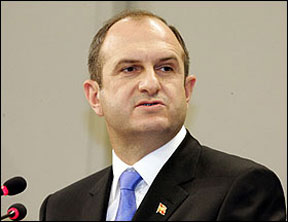Athens sees US' hand in UN envoy Nimetz's new proposals, charging he fully adopts Skopje's positions.
The 15-year dispute between Athens and Skopje over the name of Macedonia flared up after Greece expressed outrage at a new set of proposals tabled by UN mediator Matthew Nimetz.
According to diplomatic sources, the proposal provides for the phased-in usage by 2008 of FYROM's constitutional name, Republic of Macedonia, something that Greece has vehemently opposed all along, Until then, international organisations would use the name Republika Makedonija (a Slavic rendition of the constitutional name). Greece would use the name Republika Makedonija-Skopje (the country's name in Slavic with the name of the capital as a suffix), while other countries which have recognised FYROM by its constitutional name would continue to do so in bilateral relations.
Greece's use of the name Macedonia for its northern province would reportedly also be restricted, a provision that incensed the government and most Greeks, given their historical and national claim to the name as descendants of the ancient Macedonian empire of Phillip and Alexander the Great.
The National Council of Foreign Policy, a consultative body comprised of representatives of all parliamentary parties, will discuss the issue on October 18, at the request of Left Coalition leader Alekos Alavanos. The Greek Communist Party has demanded a meeting of the parliamentary committee on foreign affairs, which has yet to be set.
In an angry official statement, the Greek foreign ministry played on the prospective popular backlash, hinting that it might conduct a referendum on whether to accept FYROM's admission to international organisations under its constitutional name. The issue is especially timely in the context of the European Union, where Greece has a veto, as the European Commission is due to issue an opinion (avis) on FYROM's membership application on November 9. While Skopje applied for EU membership under its constitutional name, all EU documents use the name Former Yugloslav Republic of Macedonia.
"The Greek government and the Greek people retain in full the fight afforded by the bilateral agreement of 1995 of Greece not to consent to the participation of that country [FYROM] in any international organisation, if that is attempted with any name other than 'Former Yugoslav Republic of Macedonia'," read the October 10 statement. That agreement established FYROM as the country's name internationally until a mutually acceptable solution could be reached.
"Mr. Nimetz's new attempt literally constitutes acceptance of the positions of one side, a fact which is not consistent with the principles of mediation, the mission of which is to reach a compromise based on mutually acceptable proposals. Greece, having already shown its constructive stance, considered Mr. Nimetz's new proposals unacceptable and immediately returned them as such," the statement underlined. Almost simultaneously, the FYROM government welcomed the new proposal as a sound basis for further negotiations with Greece, in the UN framework.
The heart of the matter
The situation was exactly the opposite six months ago, when a set of proposals submitted by Nimetz was rejected by Skopje but enthusiastically embraced by Athens as the basis for negotiations. PM Costas Karamanlis had described Nimetz's April proposals as a "a unique window of opportunity" in a letter to his US and EU counterparts, despite the fact that it limited Greece's use of the name Macedonia. The April proposals were rejected by Pasok, and Karamanlis' eagerness to accept them is now viewed as having encouraged Nimetz to bend over backwards to satisfy the other side.
Greek diplomats privately describe the proposals tabled by Nimetz--a retired American ambassador who worked on the Cyprus problem after Turkey's 1974 invasion of Cyprus--as directed by the U.S. State Department, which they say wants to tie up all Balkan loose ends before tackling the final status of Kosovo next year. Greece's ambassador to the U.N., Adamantios Vassilakis, reportedly told Nimetz that he had "set up" and duped the Greek side.
The Greek foreign ministry also expressed consternation over American officials' criticism of Greece's record on minority rights. Athens called in U.S. Ambassador Ries to offer a demarche regarding U.S. Undersecretary of State Nicholas Burns' remarks on Greece's treatment of its Roma population.
U.S. Ambassador to the OSCE Julie Finley recently criticised Athens for its treatment of its Muslim, Roma and Macedonian minorities, although Athens does not recognise the existence of a "Macedonian" minority. Such remarks are viewed by Athens as heightened pressure to accept an onerous compromise on the name issue. Washington recognised FYROM by its constitutional name in November 2004, immediately after the U.S. election.
The possibility that Skopje may cite the existence of a Macedonian minority to advance territorial claims against Greece in the future lies at the heart of Athens' concern over what its northern neighbour is called. Official FYROM maps have repeatedly included parts of Greek territory in maps of that country.
There are no official figures on how many Greek citizens of Slavic decent identify themselves as Macedonian, but their Florina-based group Rainbow has lobbied for recognition as a minority. In an April letter to Nimetz, Rainbow objected to his proposal that the northern Greek province of Macedonia be called "Greek Macedonia."



